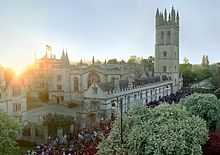Hymnus Eucharisticus

The Hymnus Eucharisticus is a traditional hymn sung by the choir of boy choristers and lay clerks of Magdalen College, Oxford in England. The choristers are boys from Magdalen College School and the lay clerks are male students from Magdalen College at the University. The hymn is best known for its role in the events of May Morning, a 500-year old tradition where the choir sings the hymn from Magdalen Tower at 6 a.m. each year on 1 May. This initiates the annual May Morning celebrations in Oxford. Large crowds gather in the High Street and on Magdalen Bridge to listen. The sound is very faint, although more recently amplification has been used. The crowds then disperse for other celebratory activities such as Morris Dancing. The hymn is also sung from the gallery of the college's Great Hall (the dining room) during important college occasions.
The music was composed by Benjamin Rogers, "Doctor of Musique of the University of Oxon, 1685", and is entered on a folio bearing the date 1673, indicating that it may have been written prior to that date. The lyrics were alleged to have been written by Dr. Nathaniel Ingelo, to be sung "at the civic feast at Guildhall on the 5th July, 1660, while the king and the other royal personages were at dinner"; however, the words of Ingelo's hymn differ significantly.[1]
The Hymnus Eucharisticus appears in several movies and television programmes, including most notably Richard Attenborough's film Shadowlands (1993) on the later years of C.S. Lewis, starring Sir Anthony Hopkins (as Lewis) and Debra Winger. Lewis, a Christian apologist and author, taught at Magdalen College, which was founded in 1458 by William Waynflete, Bishop of Winchester and Lord Chancellor, on the site of the Hospital of St. John, just outside Oxford’s East Gate.
Lyrics
|
Te Deum Patrem colimus, |
We worship you, O God the Father, |
Notes
- ↑ The Maudeleyne Grace accessed 11 August 2006.
External links
- Hymnus Eucharisticus and Music for a May Morning information from Magdalen College
- May Morning, Magdalen Tower by William Holman Hunt (1890)
- Oxford's May Morning from the BBC, 2003